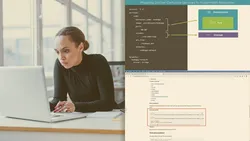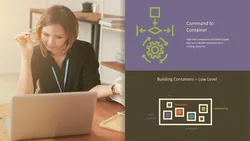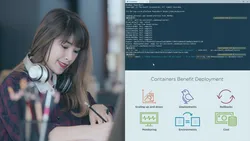
Kubernetes for Developers: Moving from Docker Compose to Kubernetes 
This course provides developers with the tools and knowledge to move their Docker Compose containers into Kubernetes for development and testing. It covers several solutions to simplify the process and introduces tools to support live development against Kubernetes. ▼
ADVERTISEMENT
Course Feature
![]() Cost:
Cost:
Free Trial
![]() Provider:
Provider:
Pluralsight
![]() Certificate:
Certificate:
Paid Certification
![]() Language:
Language:
English
![]() Start Date:
Start Date:
On-Demand
Course Overview
❗The content presented here is sourced directly from Pluralsight platform. For comprehensive course details, including enrollment information, simply click on the 'Go to class' link on our website.
Updated in [February 21st, 2023]
(Please note the following content is from the official provider.)
Do you need to move containers created with Docker Compose into Kubernetes for development or testing purposes? This course covers several solutions to simplify the process and introduces tools that support live development against Kubernetes.
As a developer, you may find that you need to move from the Docker Compose to Kubernetes. In this course, Kubernetes for Developers: Moving from Docker Compose to Kubernetes, you'll be provided with a developer-focused look at how Docker Compose services map to Kubernetes resources, and the process for moving between the two environments. First, you'll learn about different techniques and tools that can be used to convert Docker Compose YAML to Kubernetes manifest YAML such as Kompose. Next, you'll discover how Kubernetes can be used for live development of an application using a tool called Skaffold. Finally, you'll learn how to use Kompose and Skaffold to move an application from Docker Compose to Kubernetes. By the end of the course, you'll understand the available options for moving from Docker Compose to Kubernetes, and understand the different techniques that can help your productivity.
(Please note that we obtained the following content based on information that users may want to know, such as skills, applicable scenarios, future development, etc., combined with AI tools, and have been manually reviewed)
This course provides developers with a comprehensive look at how to move from Docker Compose to Kubernetes. It covers different techniques and tools that can be used to convert Docker Compose YAML to Kubernetes manifest YAML, as well as how to use Kubernetes for live development of an application. By the end of the course, developers will understand the available options for moving from Docker Compose to Kubernetes, and understand the different techniques that can help their productivity.
Possible Development Paths: developers can continue to develop their skills in Kubernetes by taking more advanced courses on topics such as deploying applications to Kubernetes, managing Kubernetes clusters, and using Kubernetes for production deployments. Additionally, developers can explore other related topics such as container orchestration, cloud computing, and DevOps.
Learning Suggestions: To get the most out of this course, developers should have a basic understanding of Docker Compose and Kubernetes. Additionally, they should have some experience with the command line and be familiar with YAML syntax.
[Applications]
Developers will be able to apply the knowledge gained to move from Docker Compose to Kubernetes. They will be able to use Kompose and Skaffold to convert Docker Compose YAML to Kubernetes manifest YAML, and use Skaffold for live development against Kubernetes. Additionally, they will be able to use the techniques learned to increase their productivity when working with Kubernetes.
[Career Paths]
1. Kubernetes Developer: Kubernetes Developers are responsible for developing, deploying, and managing applications on Kubernetes clusters. They must have a deep understanding of Kubernetes architecture and be able to write code to deploy and manage applications on Kubernetes. This role is becoming increasingly important as Kubernetes is becoming the de facto standard for container orchestration.
2. DevOps Engineer: DevOps Engineers are responsible for automating the deployment and management of applications on Kubernetes clusters. They must have a deep understanding of Kubernetes architecture and be able to write code to automate the deployment and management of applications on Kubernetes. This role is becoming increasingly important as Kubernetes is becoming the de facto standard for container orchestration.
3. Cloud Architect: Cloud Architects are responsible for designing and implementing cloud-based solutions using Kubernetes. They must have a deep understanding of Kubernetes architecture and be able to design and implement cloud-based solutions using Kubernetes. This role is becoming increasingly important as Kubernetes is becoming the de facto standard for container orchestration.
4. Kubernetes Consultant: Kubernetes Consultants are responsible for providing advice and guidance to organizations on how to best use Kubernetes. They must have a deep understanding of Kubernetes architecture and be able to provide advice and guidance on how to best use Kubernetes. This role is becoming increasingly important as Kubernetes is becoming the de facto standard for container orchestration.
[Education Paths]
Recommended degree paths:
1. Bachelor of Science in Computer Science: This degree path provides a comprehensive overview of computer science fundamentals, including programming, software engineering, and data structures. It also covers topics related to Kubernetes, such as distributed systems, cloud computing, and containerization. This degree path is ideal for those looking to develop a strong foundation in computer science and gain the skills necessary to move from Docker Compose to Kubernetes.
2. Master of Science in Cloud Computing: This degree path focuses on the development and deployment of cloud-based applications and services. It covers topics such as distributed systems, cloud architecture, and containerization. This degree path is ideal for those looking to gain a deeper understanding of cloud computing and the tools and technologies used to move from Docker Compose to Kubernetes.
3. Master of Science in Data Science: This degree path focuses on the analysis and interpretation of large datasets. It covers topics such as machine learning, data mining, and data visualization. This degree path is ideal for those looking to gain a deeper understanding of data science and the tools and technologies used to move from Docker Compose to Kubernetes.
Developing trends:
1. Automation: Automation is becoming increasingly important in the development of cloud-based applications and services. Automation tools such as Kubernetes can help developers move from Docker Compose to Kubernetes more quickly and efficiently.
2. Cloud-Native Development: Cloud-native development is becoming increasingly popular as organizations move to the cloud. This approach focuses on the development of applications and services that are designed to run in the cloud. Kubernetes is a key tool for cloud-native development and can help developers move from Docker Compose to Kubernetes.
3. Containerization: Containerization is becoming increasingly popular as organizations move to the cloud. Containers are a lightweight alternative to virtual machines and can help developers move from Docker Compose to Kubernetes more quickly and efficiently.
Course Provider

Provider Pluralsight's Stats at AZClass
Pluralsight ranked 16th on the Best Medium Workplaces List.
Pluralsight ranked 20th on the Forbes Cloud 100 list of the top 100 private cloud companies in the world.
Pluralsight Ranked on the Best Workplaces for Women List for the second consecutive year.
AZ Class hope that this free trial Pluralsight course can help your Docker skills no matter in career or in further education. Even if you are only slightly interested, you can take Kubernetes for Developers: Moving from Docker Compose to Kubernetes course with confidence!
Discussion and Reviews
0.0 (Based on 0 reviews)
Explore Similar Online Courses

Simple Watercolor Landscape Painting for Beginners

DOCUMENTARY FILMMAKING - THE BASIC RULES OF INTERVIEWING PEOPLE

Python for Informatics: Exploring Information

Social Network Analysis

Introduction to Systematic Review and Meta-Analysis

The Analytics Edge

DCO042 - Python For Informatics

Causal Diagrams: Draw Your Assumptions Before Your Conclusions

Whole genome sequencing of bacterial genomes - tools and applications

Managing Docker on Linux Servers

Fundamentals of Docker and Kubernetes for NET Developers


Start your review of Kubernetes for Developers: Moving from Docker Compose to Kubernetes